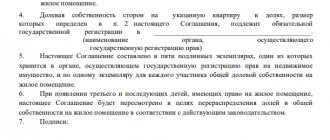- home
- Services
- The layer's services
- The layer's services
The division of property upon the death of one of the spouses occurs according to the rules of inheritance enshrined in the civil code of the Russian Federation. Even if the deceased left a will, his will cannot always be executed in full; certain categories of citizens are assigned rights to an obligatory share of the inheritance. And this rule of law has greater legal force than the terms of the will. For spouses, this rule is even stricter, because their property has joint .
Inheritance by law
After the death of one of the spouses, the joint property is first divided. The second spouse receives half of what belonged to both of them. And the remaining half is divided among all the heirs who have declared their rights. Since inheritance occurs in order of priority, and the spouse is the heir of the first priority, the inheritance after death will be divided only between representatives of the first priority. The law also includes parents and children. Thus, the remaining half of the deceased's property will be divided in equal parts among all first-degree who claimed their ashes.
Unworthy heirs may be excluded from inheritance, including:
- citizens who tried to obtain an inheritance by carrying out illegal actions;
- parents who have been deprived of parental rights in relation to the inheritance of their children’s property;
- citizens who evaded their obligations to support the testator.
In addition, persons who have committed a crime against the health and life of the testator are not allowed to inherit.
How to refuse an inheritance
Receiving an inheritance is the voluntary right of every person and he can refuse. According to the provisions of Article 1159 of the Civil Code of the Russian Federation, this can be done by submitting an application to a notary dealing with inheritance matters. In the application, the author indicates his desire to refuse in favor of someone (by naming the person’s name), or simply a refusal. Then the remaining successors will receive larger shares. Possible reasons:
- Reluctance to bear responsibility for the debts of the deceased, which will also be distributed among the successors.
- The result of an agreement between a group of relatives, this is done in order to reduce costs and simplify the procedure.
- Other.
A citizen is not obliged to thoroughly explain his goals to the notary; it is enough to draw up the application correctly and have time to submit it before the issuance of certificates of inheritance. Then the inheritance mass will be changed, the shares of the remaining successors will increase.
Inheritance by will
The deceased could not fully dispose of the joint property, therefore, if the will states that the property belonging to both spouses passes in full, for example, to a child, it cannot be fulfilled in full. Here, as with inheritance by law, the share of each spouse is first allocated, and only half of the deceased spouse is inherited according to his will. The second half immediately goes to the surviving spouse.
The division of property upon the death of one of the spouses does not occur at all if, according to the will, all the property is already assigned to the wife or husband.
List of heirs
Children can claim inheritance from their parents. They are among the first priority. Their right is paramount. This is in the absence of a will. It is important: the offspring appeared in an official marriage or not. If one has not been concluded, then the child will definitely inherit the housing from the mother when she dies. But as for a man, the fact of paternity must be established in advance, during the lifetime of the parent.
If children were adopted by strangers, then the offspring lose the right to inheritance from their biological parents.
The following can count on a compulsory inheritance share:
- adopted or natural offspring;
- minor children;
- disabled offspring;
- parents who have lost their ability to work or their spouses (disabled people of groups 1-3, women over 55 years old, and men over 60);
- dependents.
Division of property upon the death of one of the spouses in kind
According to the law, all joint property of the spouses is divided between them in equal shares, which means that each of them owns half of the apartment, car, and TV. And in the case of inheritance of such half by several persons at once, the situation will worsen even more. The remaining wife can receive 3/5 or 9/11 of the total property. The notary will indicate in the certificate only the share in the inheritance after the death of the husband, and the heirs will be asked to try to decide on the allocation of their shares in kind. If they succeed, then the agreements reached can be enshrined in the agreement. If a dispute arises, then the right to divide property after the death of a spouse and allocate shares in kind goes to the court.
Make a family agreement
An important interpretation of the law on inheritance was made by the Judicial Collegium for Civil Cases of the Supreme Court of the Russian Federation. She reviewed the decision of local courts, which dealt with the shares of the deceased person in the joint family property of the spouses.
His son from a previous marriage asked the court to determine the father’s share. The plaintiff's father died, and his wife was unable to reach an agreement with her adult son from a previous marriage on the division of the remaining inheritance.
Such family inheritance disputes are found in the practice of all courts without exception. They are complex, painful for the disputants, and not cheap. Yes, and the time can drag on for years. Therefore, if you find yourself in a similar situation, it is important to understand the main arguments that guide the most competent judges in the country when resolving such disputes.
In the lawsuit, which a citizen brought to one of the district courts of Bashkiria, there was a request to determine the shares of his father in the joint property of the spouses. The son also asked to include in the inheritance a share in the garage cooperative, half the share in the ownership of the land and to recover half the cost of the car from the widow.
The son explained in court that during the lifetime of his father and his wife, they bought a plot of land and a car. My father was also a member of a garage cooperative, which he joined before marriage.
The widow and son simultaneously applied to the notary to accept the inheritance. But the notary explained to his son that he would not inherit the plot, since the land was registered in the name of the deceased’s spouse, and the car was sold immediately after the death of the testator.
The district court, and later the Republican Supreme Son, refused. He had to go all the way to the Supreme Court of the country. There, the Judicial Collegium studied the case and said that both the district court and the appeal made mistakes in resolving this dispute.
Free transfer of a plot to one of the spouses does not make it personal property
This is what the Supreme Court of the Russian Federation saw in the materials of this case. During the marriage, by decree of the district administration, the woman was given free ownership of a plot of land “for gardening.” And the ownership of these acres is registered as expected. The woman's husband died two years after the land was registered.
Local courts, when they refused to son, said that it was impossible to include half of the plot in the inheritance and give him half of the plot, since these hundred square meters are not subject to the “joint ownership regime.” Because the citizen’s ownership of the land arose “as a result of privatization free of charge, and the joint funds of the spouses were not spent on the acquisition of the land.” The Supreme Court did not agree with this conclusion and stated that the courts “committed significant violations of substantive law.” These are the violations.
Article 1112 of the Civil Code states that the inheritance includes things and property belonging to a person on the day the inheritance is opened. This list also includes property rights. Article 1150 of the same code states that the right of inheritance belonging to the surviving spouse by will or by law does not detract from his right to that part of the property that was the joint property of the spouses. The deceased spouse's share in this property is included in the inheritance and passes to the heirs under Article 256 of the Civil Code.
The Supreme Court recalled the resolution of its plenum, specifically dedicated to inheritance cases (dated May 29, 2012 No. 9). It says that the inheritance after the death of a married person includes his share in the family property, regardless of who this property was registered in, who bought it and paid for it. The exception is the terms of the marriage contract.
From all the above rules, the Supreme Court concludes that in our case, when determining the son’s share of the plot and including this share in the common inheritance, it is legally important to determine the legal regime of this property on the day the inheritance is opened. That is, can the plot be classified as the common property of the spouses or the personal property of the widow.
Photo: Depositphotos/Photoxpress.ru
The Family Code says that common property includes movable and immovable property purchased with common income - housing, cars, furniture, and so on. And it doesn’t matter who it’s registered to or who paid. But what is received by each spouse before marriage or during marriage as a gift, by inheritance or “through other gratuitous transactions” is the property of each spouse individually.
The Supreme Court of the Russian Federation did not agree with the opinion of the district court that the land acquired by the woman was transferred to her by the district administration free of charge, which means it is considered her personal property. The High Court stated that the free transfer of a plot by a local government body to one of the spouses during marriage cannot be an absolute basis for classifying the hundred square meters as the personal property of the husband or wife. This is contrary to the Family and Civil Codes. Therefore, the testator's spousal share of the jointly acquired property must be included in the inheritance.
Local courts must now decide whether a plot of land belongs to the common property of the spouses, taking into account the clarifications of the Supreme Court of the Russian Federation.
Division of property upon the death of one of the spouses
Common property acquired over the years of married life is divided according to the rules of inheritance (SC, CC), unless an agreement on the division of property was signed between the husband and wife.
What is considered common property and is subject to inheritance:
- joint income from business, work;
- financial receipts - pensions, financial assistance from the state, various payments;
- real estate and movable property purchased during the years of marriage - housing, cars, etc., regardless of whose name it was acquired;
- shares, shares, shares purchased during marriage.
What property is not considered common:
- securities, apartments, houses, cars inherited;
- property received under a gift agreement or deed of gift;
- things for personal use in accordance with Article 36 of the Family Code, with the exception of luxury items (precious items, precious stones are subject to inheritance).
Housing not subject to division
If a couple divorces in 2021, then they will not be able to divide some of their property, since the rights to it are fully given to one of the spouses:
- what was acquired before the marriage;
- municipal housing, as well as departmental and official housing;
- real estate passed on by inheritance;
- privatization unit;
- housing donated to one of the spouses;
- belonging only to one spouse and this is fixed in the marriage contract.
It is not at all necessary that each of the former spouses will receive the same share of the property after the divorce. The shares assigned to each person are determined by law. Sometimes it is possible to deviate from equality, for example, in the interests of children under the age of majority.
If one of the spouses has been parasitizing for a long time and there is no important reason for this, his share can be reduced by the court.
When one of the spouses wasted their acquired values in vain, became addicted to alcohol, spent money on personal needs, or gambled, then their share can also be reduced.
Inherited
If one of the spouses received real estate by gift or was left an inheritance, then it becomes unimportant to whom it is registered and even who is registered in the apartment or house.
If you sell the home and then use the funds received to buy another one, the heir will not change. Everything that was purchased with the money received from the inheritance will go to the person specified in the contract.
A spouse may claim a certain share of his wife’s inherited property if, using joint money during the marriage, the property was significantly improved, repaired, or its price increased.
Let’s say the apartment belonged to the wife before marriage and she inherited it. Then, already married, the couple sold it. With the money they received, they bought a house that suited them better than the apartment. We decided to register it in my husband’s name. But he will not be able to take it away during the divorce. The right to property remains with the wife. But if money from the family budget was invested in the house, then the husband has the right to demand some part.
Acquired before marriage
If the apartment was purchased before marriage and belongs to one of the spouses, then the spouse after the divorce cannot claim it.
If a divorce case is brought to court, then it is necessary to prove: the cost of housing did not increase during the marriage and the family’s budgetary funds were not spent on improving living conditions. During married life, no repairs, expansion of the premises, redevelopment, or extensions were made.
If one of the divorcing people wants to appropriate the property of the other (which belonged to him before the wedding) and re-register it in the name of his relatives, while the former half did not consent to the transaction. No good will come of this. Such an action can be annulled, and this is done with the help of the court. The responsibilities of Rosreestr include checking the data, that is, the written consent of the other half is required for such a transaction.
Gifted
According to the law of the Russian Federation, the donation of real estate is a gratuitous transaction. The donor places the property at the disposal of the person he has chosen. This could be a relative or someone with whom he is not related by blood. There is no implied remuneration from the person to whom the housing is transferred.
If the property was received as a gift from a relative, then you will not have to pay tax, but when it comes to a stranger, you will need to give 13% to the state.
If you decide to sell the donated property in the first 3 years after receiving it, then tax must also be paid.
When one of the spouses received real estate as a gift, it is assigned to him and no one else will receive the right to the property, not even the other half. It does not matter whether the gift was received during or before the marriage.
During a divorce, a former life partner can evict his beloved, even if he managed to register him in his own real estate and he lived there almost his entire life.
It is possible that housing is given to both spouses. During a divorce, each of them is entitled to half of the property.









